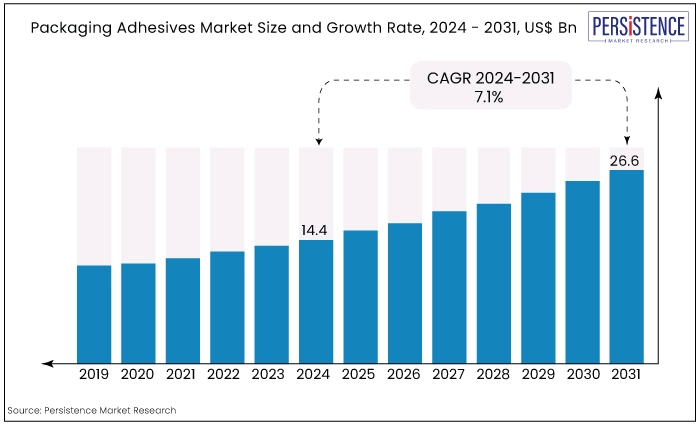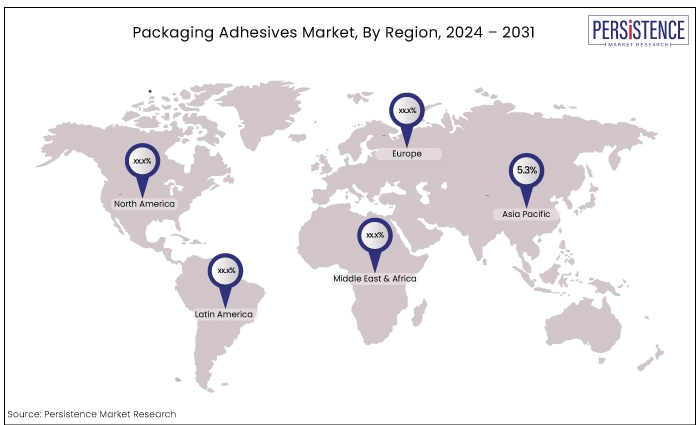Industry: Chemicals and Materials
Published Date: July-2024
Format: PPT*, PDF, EXCEL
Delivery Timelines: Contact Sales
Number of Pages: 159
Report ID: PMRREP34687
The global packaging adhesives market is estimated to value at US$26.6 Bn by the end of 2031 from US$14.4 Bn recorded in 2024. The market is expected to secure a CAGR of 7.1% in the forthcoming years from 2024 to 2031.
Key Highlights of the Market
|
Market Attributes |
Key Insights |
|
Packaging Adhesives Market Size (2024E) |
US$14.4 Bn |
|
Projected Market Value (2031F) |
US$26.6 Bn |
|
Forecast Growth Rate (CAGR 2024 to 2031) |
7.1% |
|
Historical Growth Rate (CAGR 2018 to 2024) |
6.6 % |
The packaging adhesives market plays a pivotal role in ensuring the integrity, durability, and functionality of various packaging solutions across multiple industries, including food and beverage, pharmaceuticals, consumer goods, and industrial applications.
These adhesives are essential for bonding, sealing, and laminating different packaging materials, such as paper, plastics, metals, and composites.
The market is experiencing significant growth due to the rising demand for sustainable and eco-friendly packaging solutions, advancements in adhesive technologies, and the increasing emphasis on reducing packaging waste.
Innovations like bio-based adhesives, smart adhesives with advanced bonding properties, and solvent-free formulations are driving the sector forward.
With growing consumer awareness and stringent regulatory standards, the packaging adhesives market is poised for robust expansion, offering numerous opportunities for manufacturers and suppliers.
The market will remain influenced by innovations such as eco-friendly formulations, advanced bonding technologies, and smart adhesives for enhanced performance, sustainability, and efficiency in packaging applications. The market will witness development of versatile, low-VOC, water-based adhesives for various packaging applications.
There will be notable growth in demand for flexible packaging solutions requiring specialized adhesive properties for optimal performance. Innovations focused on adhesives that enhance the recyclability of packaging materials will be at the forefront.

The packaging adhesives market has witnessed substantial growth over the past decade, driven by the increasing demand for innovative packaging solutions in sectors such as food and beverage, pharmaceuticals, and consumer goods.
The adoption of eco-friendly and sustainable adhesives, along with advancements in adhesive technologies like hot melt, water-based, and solvent-free formulations, has fueled market expansion.
Enhanced focus on reducing packaging waste and improving recyclability has further bolstered market growth. The market is poised for continued growth, propelled by rising consumer awareness and stringent environmental regulations.
Innovations in bio-based adhesives and smart adhesives with superior bonding properties are expected to play a crucial role. Additionally, the increasing e-commerce sector and demand for lightweight and flexible packaging will drive the need for advanced adhesive solutions, ensuring robust market growth in the coming years.
Innovations in Hot Melt and Water-Based Adhesives Enhance Performance and Application Versatility
Innovations in hot melt and water-based adhesives are significant growth drivers for the packaging adhesives market.
Hot melt adhesives offer rapid bonding and curing times, making them ideal for high-speed packaging lines. These adhesives also provide strong bonds and are versatile, suitable for a variety of substrates including paper, plastic, and metal.
Water-based adhesives, on the other hand, are favored for their low environmental impact, as they are free from volatile organic compounds (VOCs), and solvents. They offer excellent adhesion and are ideal for applications requiring flexibility and durability.
Continuous advancements in these adhesive technologies enhance their performance, making them more efficient, sustainable, and adaptable to a wide range of packaging requirements, thus driving market growth.
Shift Towards Flexible Packaging in F&B Creates Higher Demand for Effective Adhesives
The shift towards flexible packaging in the food and beverage industries is a key growth driver for the packaging adhesives market. Flexible packaging, which includes pouches, sachets, and bags, is favored for its lightweight, cost-effective, and convenient properties.
This type of packaging requires advanced adhesives that can provide strong seals, maintain product integrity, and withstand various environmental conditions.
The demand for effective adhesives is heightened by the need to ensure food safety, extend shelf-life, and enhance the visual appeal of packaging. Additionally, flexible packaging often involves diverse materials, such as films, foils, and laminates, which require specialized adhesives to bond effectively.
This market trend towards flexible packaging is driving innovations and increasing the demand for high-performance, reliable adhesive solutions in the market.
Innovative Sealing Techniques May Reduce Traditional Adhesives
Innovative sealing techniques, such as advanced heat sealing, ultrasonic welding, and adhesive-free bonding methods, may reduce the reliance on traditional adhesives in packaging.
These methods offer efficient and durable alternatives for securing packages, which can diminish the demand for conventional adhesives. As these technologies become more widespread, they provide cost-effective and high-performance solutions that challenge the traditional adhesive market.
Consequently, the growth of packaging adhesives may be impeded as companies adopt these alternative sealing methods to enhance packaging efficiency and performance.
Inadequate Bonding Strength or Longevity Could Impede Market Acceptability
Inadequate bonding strength or insufficient longevity in adhesives can significantly impede market acceptability.
If adhesives fail to provide a strong, durable bond under various conditions—such as exposure to extreme temperatures, humidity, or stress—packaging integrity and product safety can be compromised. This can lead to increased product returns, customer dissatisfaction, and potential damage during transportation or storage.
Adhesives that do not meet performance expectations may also result in higher costs due to the need for additional protective measures or packaging materials.
Manufacturers may thus seek alternative solutions or higher-performing adhesives, impacting the demand for existing products. To remain competitive, adhesive suppliers must continually enhance their products to ensure reliable performance and meet evolving industry standards.
Specialized Adhesives for Pharmaceutical Packaging to Ensure Secure, Compliant Seals
Specialized adhesives for pharmaceutical packaging present a significant future opportunity in the packaging adhesives market. These adhesives are designed to meet stringent regulatory requirements, ensuring secure and tamper-evident seals that protect sensitive pharmaceuticals from contamination and tampering.
By developing adhesives that comply with health and safety regulations, companies can address the increasing demand for secure, reliable packaging solutions in the pharmaceutical sector.
Innovations in this area include adhesives that provide barrier protection, are resistant to various environmental factors, and meet specific regulatory standards. As the pharmaceutical industry continues to prioritize product safety and integrity, the demand for these specialized adhesives is expected to grow.
Expanding Demand for Flexible Packaging Adhesives
Expanding adhesives for flexible packaging presents a key future opportunity in the packaging adhesives market.
As flexible packaging continues to gain popularity due to its versatility and cost-effectiveness, there is a growing need for adhesives that enhance performance across various substrates like films and laminates.
Innovations in this space focus on developing adhesives that provide superior bonding strength, flexibility, and resistance to environmental factors. These advancements improve the functionality and durability of flexible packaging solutions, catering to diverse industry needs and driving growth in the market.
|
Category |
Projected CAGR through 2031 |
|
Technology - Water-based |
8.5% |
Water-based Adhesives Most in Demand
The global market has been segmented into water-based, solvent-based, hot melt, and other categories depending on technology. Through 2031, the water-based market is expected to grow at a high-value CAGR of 8.5%.
Market forces are important in the paper and packaging industries. They are utilized for laminating paper, lining food packaging, and adhering labels. Additionally, producers also have an incentive to create environmentally friendly items with minimal negative effects on the environment. Water serves as the carrier for water-based adhesives, which provide reliable bonding and strength.
Furthermore, they are regarded as safe for use in the food business. They are utilized in a variety of packaging materials, including flexible packaging. The use of water-based adhesives is growing quickly due to its stability and consistency.
|
Region |
CAGR through 2031 |
|
Asia Pacific |
5.3% |
Innovative Packaging Designs Uplift Dominance of Asia Pacific
The development of innovative package designs along with technical improvements is expected to propel the demand for packaging adhesives in Asia Pacific at a CAGR of 5.3% through 2031.
Additionally, producers are trying to lower the manufacturing process' overall cost. They intend to create new items with creative packaging and assembly techniques as well.
Newly developed packaging adhesives on the market have better qualities including high tensile, high strength, and resilience to high temperatures.

The packaging adhesives market is highly competitive, with key players focusing on innovation, sustainability, and strategic partnerships to maintain their market positions.
Leading companies like Henkel, 3M, and H.B. Fuller dominate the market with comprehensive product portfolios and global reach. Henkel is renowned for its eco-friendly formulations, while 3M's innovations in adhesive technologies keep it at the forefront.
H.B. Fuller excels in custom adhesive solutions for diverse packaging needs. BASF and Dow Inc. are also significant players, emphasizing sustainable and high-performance adhesives.
New entrants and regional players are intensifying competition by offering cost-effective and specialized solutions. Continuous R&D, mergers, and acquisitions are pivotal strategies driving growth and maintaining competitive edge in this dynamic market.
January 2024
Nestlé partnered with Self-Heating Technologies, Inc. to co-develop new self-heating packaging for ready-to-eat meals, aiming to enhance consumer convenience and provide innovative solutions for on-the-go meal consumption.
April 2024
BASF collaborated with EcoPack Solutions to develop recyclable adhesives for flexible packaging, targeting the reduction of plastic waste and promoting sustainability in packaging solutions.
May 2024
Dow Inc. unveiled their latest hot melt adhesive technology, designed for high-speed packaging lines, which aims to improve efficiency and bonding strength, catering to the needs of fast-paced production environments.
|
Attributes |
Details |
|
Forecast Period |
2024 to 2031 |
|
Historical Data Available for |
2018 to 2023 |
|
Market Analysis |
US$ Million for Value |
|
Key Regions Covered |
|
|
Key Market Segments Covered |
|
|
Key Companies Profiled in the Report |
|
|
Report Coverage |
|
|
Customization & Pricing |
Available upon request |
By Technology
By Resin
By Application
By Region
To know more about delivery timeline for this report Contact Sales

The demand for packaging adhesives is surging due to increased e-commerce activities, the push for sustainable and eco-friendly packaging solutions, advancements in adhesive technologies, and the need for durable, reliable bonding in flexible and lightweight packaging applications.
Some of the key players operating in the market are Henkel AG & Co. KGaA, 3M Company, Avery Dennison Corporation, H.B. Fuller Company and Arkema Group.
Water-based segment recorded the significant market share.
A compelling opportunity in the packaging adhesives market is the development of bio-based and recyclable adhesives, meeting the growing demand for sustainable packaging solutions and aligning with stringent environmental regulations and consumer preferences for eco-friendly products.
Asia Pacific is poised to account for the significant share of the market.